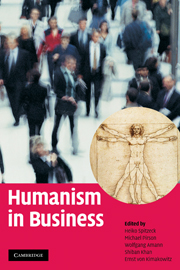Book contents
- Frontmatter
- Contents
- List of figures
- List of tables
- List of editors and contributors
- Acknowledgements
- Humanistic Management Network: paving the way towards a life-serving economy
- Introduction
- Part 1 Philosophic-historical grounding of humanism
- Part 2 Towards an integration of humanism and business on a systems level
- Part 3 Humanistic management
- Part 4 The individual as a change agent for a humane business society
- 19 Ethical codes at work
- 20 The daunting challenges of globalization and the power of individuals in cross-stakeholder networks for a humanistic face of globalization
- 21 The leader as responsible change agent: promoting humanism in and beyond business
- 22 Quiet leadership – a way to sustainable positive change
- 23 Everyone a changemaker: social entrepreneurship's ultimate goal
- 24 Social business entrepreneurs are the solution
- 25 Concluding observations
- Index
- References
21 - The leader as responsible change agent: promoting humanism in and beyond business
Published online by Cambridge University Press: 25 January 2011
- Frontmatter
- Contents
- List of figures
- List of tables
- List of editors and contributors
- Acknowledgements
- Humanistic Management Network: paving the way towards a life-serving economy
- Introduction
- Part 1 Philosophic-historical grounding of humanism
- Part 2 Towards an integration of humanism and business on a systems level
- Part 3 Humanistic management
- Part 4 The individual as a change agent for a humane business society
- 19 Ethical codes at work
- 20 The daunting challenges of globalization and the power of individuals in cross-stakeholder networks for a humanistic face of globalization
- 21 The leader as responsible change agent: promoting humanism in and beyond business
- 22 Quiet leadership – a way to sustainable positive change
- 23 Everyone a changemaker: social entrepreneurship's ultimate goal
- 24 Social business entrepreneurs are the solution
- 25 Concluding observations
- Index
- References
Summary
The findings of a global survey carried out for the World Economic Forum 2007 show a growing lack of confidence in leaders, both in politics and in business, to improve the lives of people on this planet (Gallup 2007). Respondents all over the world, but especially in Europe and the Americas, worry about safety and they don't trust current business leaders to ensure a prosperous world for the next generation. Obviously, even a few years after the corporate scandals in the United States and elsewhere, business leaders still face a significant lack of trust in the wider public.
Not surprisingly, then, we find an exponential increase in corporate social responsibility (CSR) activities and reporting over the past years through which businesses want to show that they act responsibly, are good corporate citizens, and contribute to the well-being of societies in which they operate. “Re-building public trust” is arguably a priority for business leaders at home and abroad, and corporate responsibility among their core challenges. In fact, there is widespread agreement that it takes responsible leadership to build and sustain a business in society. The UN Global Compact and the European Foundation for Management Development (EFMD) call for “Globally Responsible Leadership” as a “global exercise of ethical, values-based leadership in the pursuit of economic and societal progress and sustainable development” (EFMD 2005: 2) And in business schools around the world, but especially in the US, we see “a frenzy of activities,” as the late Sumantra Ghoshal (2005) notes in his pledge to rethink business education.
- Type
- Chapter
- Information
- Humanism in Business , pp. 358 - 374Publisher: Cambridge University PressPrint publication year: 2009
References
- 4
- Cited by

